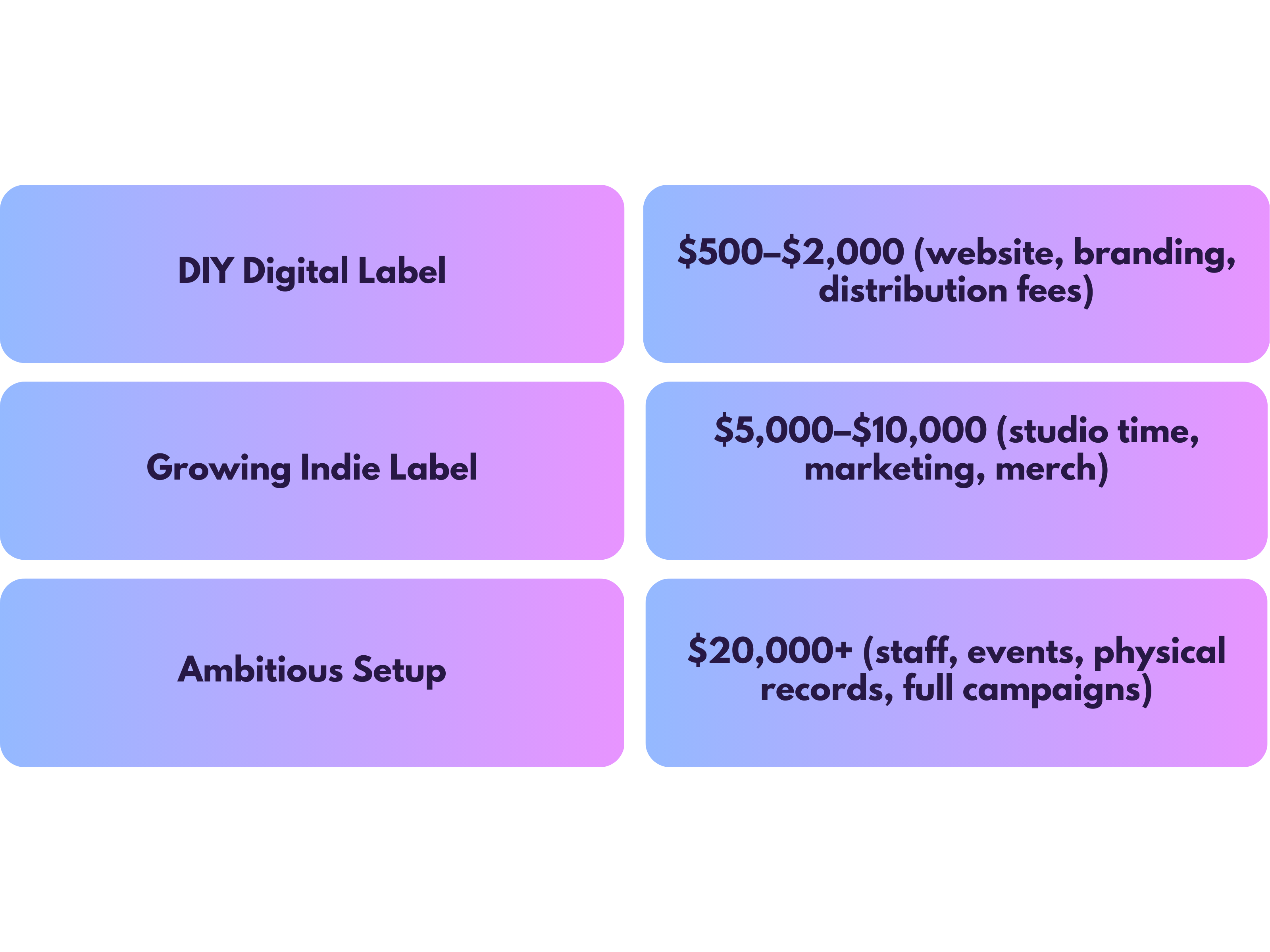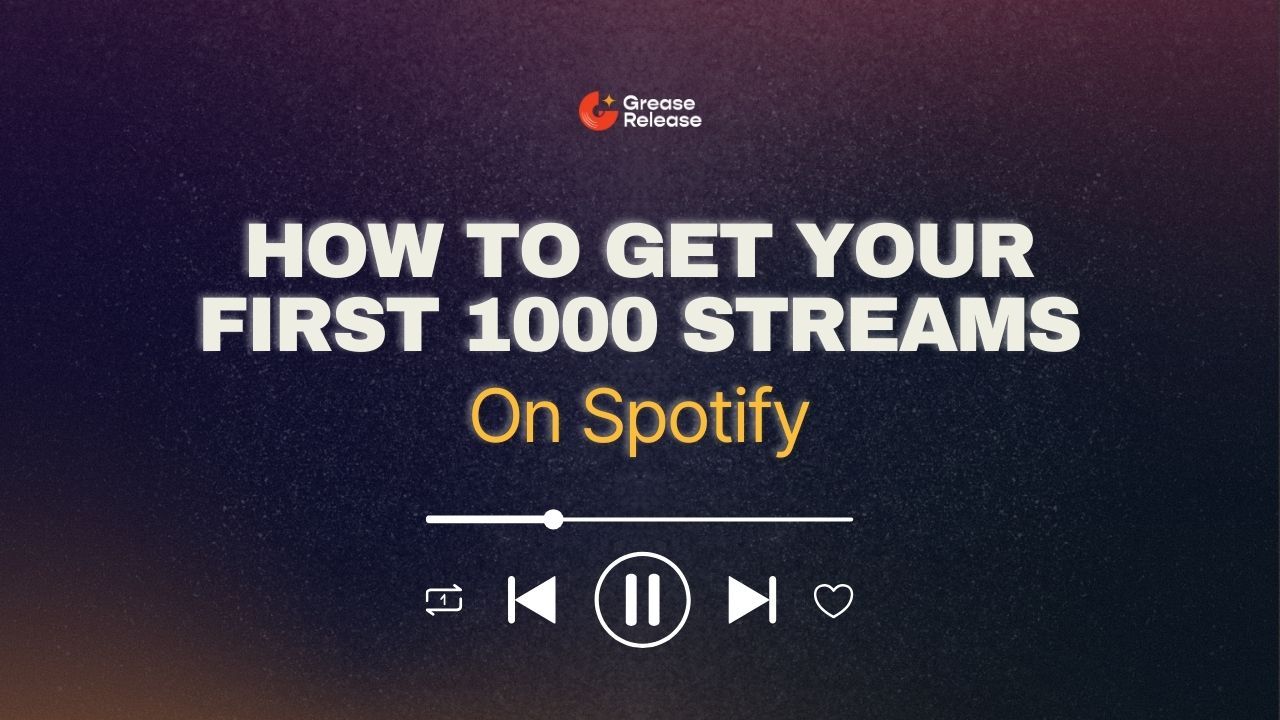
How To Start A Record Label
Sep 22, 2025Setting up a Record Label in 2026
Whatever your reason, you’ve probably typed into Google: how to start a music label or how much would it cost to start a record label. The truth? It’s not as impossible (or as expensive) as people think—but it is a grind. Let’s break it down, step by step, without the corporate jargon.

In this blog, we’re breaking it all down:
- Why even start a Record Label?
- Step 1: Define Your Vision and Identity
- Step 2: Legal Structure and Business Setup
- Step 3: Funding and Budgeting
- Step 4: Branding and Marketing
- Step 5: Build Your Team
- Step 6: Put Systems in Place (a.k.a. Your Toolkit)
- Step 7: Sign Artists (the Fun Part)
- Step 8: Promote Like Crazy
- Step 9: Long-Term Strategy
- FAQ: Advanced Questions About Starting a Record Label
Why even start a Record Label?
Starting a label isn’t about a shiny title—it’s about control, creativity, and independence. It lets you release music on your own terms, build a brand, and back artists who share your vision. Tired of industry gatekeepers? With your own label, you stop waiting for opportunities and start creating them.

Step 1: Define Your Vision and Identity
Before you print hoodies with your logo, ask yourself: Why am I starting this label? Who do I want to represent? What kind of music do I believe in? If your only answer is “to make money,” you’re already behind. A label with no identity quickly gets lost in the noise, while one with a clear direction can carve out a loyal audience.
The best indie labels—think XL Recordings, Stones Throw, or Sub Pop—didn’t start with massive budgets. They started with taste, passion, and a clear sound or culture they wanted to amplify.
Want to sign every genre under the sun? Bad move. Pick a lane. That’s how you build identity and loyalty.
Step 2: Legal Structure and Business Setup
Before signing any artists or releasing music, you’ll need to make your label official. That means registering your business, setting up a legal structure (like an LLC or LTD), and making sure your finances are in order. This is the unglamorous part, but it’s what separates a “hobby project” from a legitimate business.
Step 3: Funding and Budgeting
Starting a label doesn’t require millions, but it does require smart money management. Think about startup costs like registering the company, branding, distribution fees, marketing campaigns, and maybe even advances for artists. Some labels bootstrap with savings, while others look for investors or grants. The key is being realistic—cash flow is king.
Here’s the spectrum:
Step 4: Branding and Marketing
Picking a name and logo isn’t just an artsy exercise—it’s identity. A strong label name tells fans what they’re signing up for.
Think about the story you want to tell, how your visuals represent your artists, and what message you’re putting out into the world.
In 2026, marketing isn’t just about radio play; it’s about TikTok trends, YouTube content, email newsletters, and community building. Labels that thrive are the ones that know how to turn listeners into lifelong fans.
Step 5: Build Your Team
When you first start a record label, you’ll probably do everything yourself—A&R, marketing, design, finance. But as you grow, you’ll need help. A one-person label is possible, but to scale, you’ll eventually need a team.
This could mean an A&R scout to find talent, a marketing manager to run campaigns, or a lawyer to help with contracts. Collaboration is what helps indie labels punch above their weight.
Step 6: Put Systems in Place (a.k.a. Your Toolkit)
Even a small operation needs a backbone. You’ll need:
- Music distribution (Ditto, DistroKid, CD Baby)
- Legal contracts (protect yourself and your artists)
- Marketing tools (socials, newsletters, websites)
- Maybe even a studio setup—or just good relationships with studios
The key? Don’t overspend at the start. Buy only what helps you move forward right now.
Step 7: Sign Artists (the Fun Part)
Here’s where it gets exciting. Scouting talent is the lifeblood of your label. Check SoundCloud, TikTok, Bandcamp, local gigs—anywhere raw talent lives.
But here’s the critical part: be fair. Too many labels have burned artists with shady deals. If you want longevity, build trust. Offer transparent contracts, invest in your artists, and treat them like partners—not products.
Step 8: Promote Like Crazy
Having great music is useless if nobody hears it. Distribute tracks to streaming platforms, sure—but also think beyond. Build playlists. Get tracks on TikTok trends. Make cool visuals. Pitch to blogs. Throw pop-up shows.
This is also how to make money as a record label: streams, sync deals (TV/film placements), merch, live events. Multiple revenue streams = survival.
Step 9: Long-Term Strategy
Anyone can throw together a label and sign an artist or two. The challenge? Sticking around. Focus on building community, reputation, and a roster that excites people The bitter truth is that most labels won’t see profits right away. Success comes from building a reputation over time, investing in artists’ growth, and adapting to industry shifts. Some labels focus on niche genres, others build wide rosters—but the common thread is patience, persistence, and adaptability.
Want to dive deeper? Here’s a YouTube video that explains the whole process in detail:
FAQ: Advanced Questions About Starting a Record Label
1. How do I find artists to sign?
Look online, at local shows, and in music communities. Network relentlessly—connections matter more than cold emails.
2. How do record labels make money?
Primarily through royalties (from streaming, sales, licensing) and sometimes live performance deals or merchandise.
3. How important is branding?
Crucial. Your brand tells your story, attracts fans, and signals credibility to artists and partners.
4. Can I start a label on a budget?
Yes. Smart use of digital distribution and social media can launch your label without breaking the bank.
5. How to stay competitive?
Adapt, track trends, use data, and nurture your artists. The industry punishes complacency.
We at GreaseRelease, have a bunch of curators on our network who are looking for new & exciting music to push on their massive playlists. If you make music and want to reach a wider audience, check out our submission platform and get a chance to reach millions of listeners! Submit your tracks now!
Don't miss my newsletter!
Join me on a music entrepreneurship journey with new tips and tricks delivered straight to your inbox.
We hate SPAM. We will never sell your information, for any reason.




